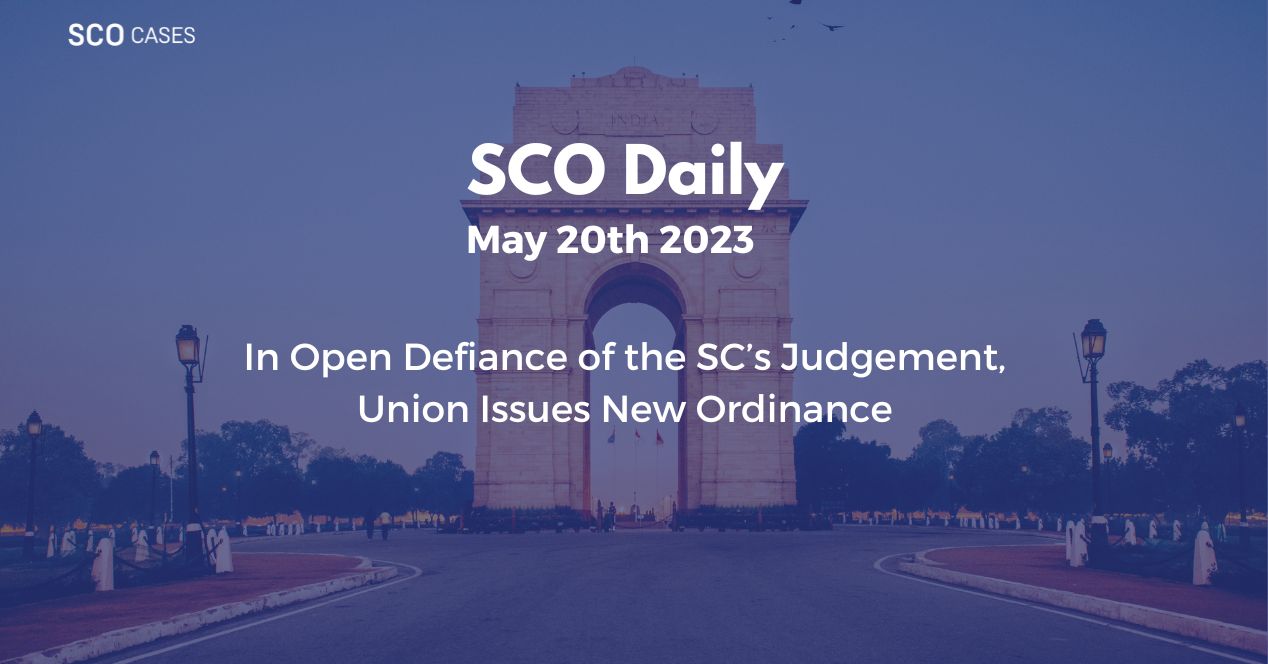Analysis
SCO Shorts: Administrative Control of Delhi
What is the power-struggle between the Delhi and Union governments all about? Why does it matter?

Introduction
On May 11th, 2023, an SC Constitution Bench ruled that the Delhi government must control civil servants in the national capital. This decision follows the 2018 Judgement (also a 5-Judge Constitution Bench) which held that the Lieutenant Governor of Delhi is bound by the aid and advice of Delhi’s Council of Ministers. While the 2023 Judgement appeared to put to rest the longstanding dispute over the control of Delhi, the Union directly contradicted it through a subsequent Ordinance.
What is the Case About?
The dispute between the Union and the Delhi government, in this case, centres around the control of ‘services’ and civil servants in Delhi. Article 239AA retains the National Capital Territory (NCT) of Delhi’s status as a Union Territory, but also grants it state-like features. Under Art.239AA, the Delhi government possesses the power to make law on services. However, since Delhi does not have its own public service commissions, civil servants in Delhi come from Union-controlled cadres like the All India Service, DANICS, and DASS. This led to a tussle between the Union and Delhi governments over who must control these civil servants in the NCT of Delhi.
What’s So Special About Delhi?
Delhi enjoys a unique (‘sui generis’) status compared to other States and Union Territories. Under Article 239AA, Delhi remains a Union Territory but possesses certain State-like features. As a Union Territory, the NCT of Delhi is an extension of the Union of India. Union Territories are directly governed by a Union-appointed Administrator (for Delhi, this is the Lieutenant Governor). However, since Delhi also has a democratically elected Legislative Assembly and Council of Ministers, the Lieutenant Governor’s powers are severely limited compared to the Administrators of other Union Territories.
Why Does It Matter?
The case raises key questions on the federal structure and the power-sharing relationship between the nationally elected Union government and the regionally elected Delhi government. Considering Delhi’s decades-long demand for statehood and the national interest in the capital city, the Judgement appears to be a way forward to balance both interests under the Constitution. Moreover, this case has a direct bearing on the powers of an elected government and the practical aspects of these powers.
What Did the Petitioners Argue?
The Delhi government pointed out the necessity of holding civil servants accountable to the Delhi government while working under it. If Delhi’s ministers are unable to control the civil servants working under them, then there is no accountability in implementing policies and Delhi’s voters would ultimately suffer.
Further, since the Delhi government’s powers originate from Schedule 7 of the Constitution, only a Constitutional Amendment can change the Delhi government’s powers. Entry 41 of the State List, the focus of this case, grants the Delhi government power over civil servants in the NCT. No Amendment was made by Parliament to take away this power.
What is the Union’s Stance?
The Union government focused its arguments on Delhi’s identity as the national capital. This makes Delhi significant in the national scheme of things, warranting direct control by the Union instead of a federal structure of governance. Further, the lack of a separate service commission for Delhi indicated Parliament’s intent to retain administrative control in the NCT. However, the Union claimed that they only wished to retain administrative control over Delhi while the Delhi government would continue to hold ‘functional’ control.
What Was the SC’s Ruling?
On May 11th, 2023, a 5-Judge Constitution Bench upheld the Delhi government’s powers to control civil servants in the NCT of Delhi. The Bench emphasised the importance of a federal structure of governance, highlighted the NCT’s unique status, and clarified how the Union and Delhi governments will share power in the capital city.
The Bench held that without the power to hold Delhi’s civil servants accountable, the Delhi government would not be able to give effect to any law or policy formulated by them. This diminishes the role of Delhi’s voters who hold the Delhi government accountable through political franchise.
The Judgement also clarified that under Art. 239AA, the Delhi Legislature and Executive will both have the power to make law on services in the NCT. The same power is also available to Parliament, which can override the Delhi government, but not to the Union Executive.
Union Ordinance: Back to Square One?
Eight days after the SC’s verdict, the Union issued an Ordinance that explicitly bars the Delhi government from making laws on services regardless of what ‘any court’ says. Further, it creates a 3-member body, called the National Capital Civil Service Authority (the Authority), which will control civil servants in the NCT of Delhi. This Authority will comprise two Union appointees and the Chief Minister of Delhi, and will make all decisions through internal voting. Most notably, the Authority’s decisions must be approved by the Lieutenant Governor who will have the ‘sole discretion’ to override it.
Since the Union Executive issued the Ordinance (pending Parliamentary approval), it raises substantial questions about its validity. At the same time, the Union government filed a review petition challenging the SC’s decision.


